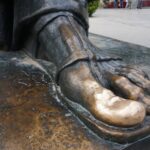Historian Ante Nazor, a member of government’s “historical commission”, explains his position.
Ante Nazor, a member of the newly-established Council for Consequences of the Rule of Undemocratic Regimes, which the government established on Thursday and which is often called “commission for dealing with the past” or “historical commission”, presented his position about the commission and some historical issues, reports Večernji List on March 3, 2017.
“This council has been established at a time when we are witnessing deep divisions within the Croatian society, when there is a societal atmosphere which is not healthy and which has been caused by ignoring the facts for many years. When we look at how complex the Croatian history is, starting from the 1940s and the civil war, the post-war period and the totalitarianism of an undemocratic regime, all the way to the 1990s and the Serbian aggression against Croatia which has caused a new trauma, it is normal that the time has finally come to deal primarily with the historical period which we have left unexplored, and that is a big whole from the 1945 onwards”, said Lucić speaking for Nova TV.
He stressed that he was pleased that the government had decided to begin to tackle the problem and that it will leave everything to other institutions, because it is not a problem that can be dealt with by the prime minister or ministers. “However, this is not an issue just for historians, because the situation in the society is such this it has much wider societal importance. That is the reason why the commission is multidisciplinary and is a combination of historians, lawyers and all those who are involved in the research that can help us finally get away from all totalitarianisms”, said Nazor.
The council’s recommendations will be made on the basis of discussion among people who do not think the same, which is a crucial element, according to Nazor. Members of the commission should in the end agree about things that are indisputable.
For example, there is no doubt that Tito was an important historical figure, and it is necessary to discuss him at scientific and expert conferences. “As far as I am concerned, I would have done what the President had done with him. His place is in museums, and not in the names of public streets and squares”, said Nazor, adding that people should never generalize because nothing is black and white. At the beginning of her term, President Kolinda Grabar-Kitarović removed Tito’s bust from her office and had it placed in a museum.
“We always talk about regimes and accountability of regimes. That is why this commission is called the council for undemocratic regimes, and we will see what will happen. As for Tito, my position is very clear. He is a historical figure, but a person who was responsible or participated in mass murders cannot have a square in any town in Croatia”, concluded Nazor.







